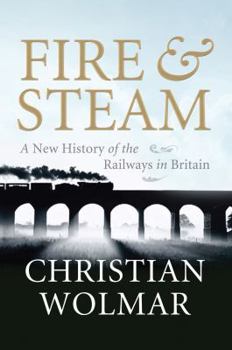Fire & Steam: A New History of the Railways in Britain
Select Format
Select Condition 
Book Overview
'Fire & Steam' tells the dramatic story of the people and events that shaped the world's first railway network, one of the most impressive engineering achievements in history.
Format:Hardcover
Language:English
ISBN:1843546299
ISBN13:9781843546290
Release Date:March 2009
Publisher:Atlantic Books (UK)
Length:364 Pages
Weight:1.75 lbs.
Dimensions:1.4" x 6.4" x 9.3"
Customer Reviews
1 rating
A passionate history of Britain's railroads
Published by Thriftbooks.com User , 14 years ago
Few inventions did more to change life in Britain than the railroads. Since the establishment of the first steam-powered lines in the early 19th century, they demolished locality, lowered the cost of goods, and made cheap travel a reality for millions of Britons. Yet as Christian Wolmar shows, this transformation was hardly a smooth one, shaped first by numerous growing pains and then the vagaries of government policy. This history, and its role in shaping Britain's railroad system today, is the subject of his book, which describes both how the railroad changed Britain and how Britons, in turn changed the railways. Wolmar's scope is a broad one, ranging back to the early gravity- and horse-drawn routes of the 17th century. Yet it is not until steam engines were introduced that the railroads emerged as a prominent mode of transportation. While initially envisioned primarily as a means of moving freight, Wolmar notes that railroads soon found transporting passengers to be their most lucrative source of revenue. Soon railroad lines sprang up throughout Britain, and by the start of the twentieth century lines reached nearly every corner of the island. Yet dominance bred complacency, and the railroads were slow to respond to the challenge posed by the emergence of road haulage in the early twentieth century. Hobbled by under-investment during the two world wars and handicapped by successive (and sometimes conflicting) government mandates, Britain's railroad network was in decline by the second half of the twentieth century. Yet for all of these problems Wolmar is optimistic about the future of railroads, arguing that despite continued dithering over investment in its infrastructure, technological innovation promises to deliver improvements in performance that can ensure the survival of railways for another century. A journalist and self-styled "transport commentator", Wolmar's passion for his subject shines through on every page. He writes in a light and readable style that conveys well his extensive knowledge of Britain's railroads without burdening his readers with minutiae. This combination makes his book a superb starting point for anyone seeking to learn more about Britain's railroads and the country's long, oftentimes troubled, yet always fascinating relationship with them.






